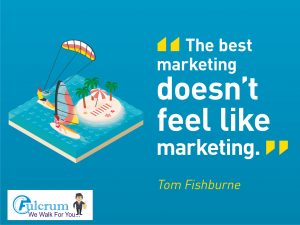B2B Experiential Marketing – When does it work?
What is experiential marketing? On the rise in recent years, B to C Marketing organizations in pune and experiential marketing is all about customer interaction with your brand. It offers a unique experience with products or services, allowing customers to get a feel for how they would use it in their lives. For years marketers have been trying to get customers to use and trial their products. In this way it’s not a new concept; there have however, certainly been some innovative spins on how it’s done. Let’s look at experiential marketing, how it can work for B2Bs and some of the ways it can help build your brand.Emotional + Experiential Branding = Experiential Marketing The two elements that underpin experiential marketing are emotional branding and experiential branding.
Emotional branding: is about building the relationship between your brand and customers. Promoting emotional benefits like brand trust, security and credibility as a result of engaging with your brand is crucial. Experiential branding: designs and creates interactions that are sensory in nature, which emotionally influences preferences, shaping brand perception, and influencing satisfaction and loyalty. An excellent experiential marketing campaign is able to fuse both elements seamlessly together. Experiential Marketing for B2Bs In recent years interest in B2B experiential marketing has grown and some of the initial hesitation surrounding it has been replaced with a working understanding, when to do it, and how it stimulates ROI. For B2Bs, experiential marketing is generally less obvious, with the focus often on services (for example) in place of B2C exciting product launches. Oftentimes the B2B budget is also stretched. However we are seeing marketers begin to recognise the potentials that the experience can offer consumers. “The success of brand experience within the B2C market has not gone unnoticed, and B2B marketers are waking up to the potential of brand experience. However, there is a long way to go before they catch up with their B2C counterparts.” – Graham Ede, Ion Group 3 Examples of B2B experiential marketing Location with B2Bs can be one of the major barriers, and while it may not be easy to do experiential marketing in quite the same way as B2C, there’s certainly room to employ some of the same principals. Creating sensory interactions that promote core feelings of trust, and awareness of your product or services is central to this. Fulcrum marketing in public spaces – Linked with experiential, some marketers use a form of Fulcrum marketing. They tend to hold this drive in places where there are high concentrations of business buyers. Branded promotional staff can offer business people the opportunity to enter in a promotion, or sign up to attend an event whilst promoting the benefits of the product. demonstrations & reward – as part of a targeted marketing strategy, those in the IT space can offer information via webinar or video, which can showcase some aspects of the technology solution. Some marketing and web-based tools such as offer a free trial period, together with online coaching via Skype. This allows the user to build confidence in using the tool, and to experience all of the benefits of the trial period. At the end of the trial period (7 days), the participant is given a report with feedback on how well they have used the tool. Then they are awarded a certificate. Surprises and games – Surprising customers by showing up where they least expect you, gifting them, or sending them a card is a way to provide an out of the box experience and drive brand awareness. Another option could be to exhibit at a partner’s event as IBM did. Their interactive stand came complete with a candy bar, and plasma screens which posted live tweets from event attendees. Digital technology such as apps and games are also opportunity areas, and while often costly, look set to become more widespread and affordable in future. Experiential marketing reflects the growing importance of emphasising emotions to build successful brands. Digital media offers expanding opportunities to offer such experiences. In the ever-competitive B2B marketplace, it’s no longer enough to rely on traditional modes for lead generation. B2B marketers need to consider the complete kit that is available to them including; social media, mobile, search, paid advertising, print, telemarketing and increasingly placing emotion at the heart of it all with an experiential approach.



